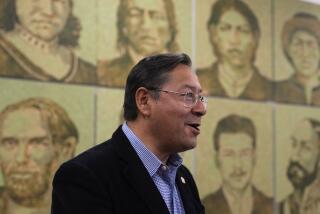Burundi Forces Quash Coup Attempt
- Share via
BUJUMBURA, Burundi — The Burundian army put down a coup attempt Wednesday by a group of junior army officers opposed to President Pierre Buyoya’s negotiations with Hutu rebels, the Defense Ministry said.
Burundi’s defense minister said that all dissident soldiers who launched the failed takeover gave themselves up peacefully early today and were in custody.
“All the soldiers who were [in the coup attempt], they surrendered. We captured them. No one was killed. No one was wounded,” Defense Minister Cyrille Ndayirukiye said.
In a statement read on independent Bonesha radio Wednesday, the military said 30 junior officers in the Tutsi-dominated army were surrounded inside the studios of state-run Radio Burundi.
Soldiers had been deployed around the Radio Burundi station in downtown Bujumbura, the capital. Streets were sealed off near the building, but residents walked calmly through downtown, discussing the standoff. No violence was reported.
While all independent radio stations carried the army communique, Radio Burundi broadcast music.
A group calling itself the Patriotic Youth Front took over the station at 4:30 p.m. and played a tape announcing Buyoya’s removal from office, the dissolution of the National Assembly and closure of the airport. The statement was attributed to Lt. Gaston Ntakarutimana. Officials said the group had never been heard of before.
Ntakarutimana was a commander at the Gakumbo military camp, which is responsible for protecting the airport, and the soldiers who seized the radio station were under his command.
Buyoya was in Libreville, the capital of Gabon, for peace talks with the leader of the main Hutu rebel group fighting the government in Burundi’s 7 1/2-year civil war. He was in a meeting with South African Deputy President Jacob Zuma when news of the coup attempt was broadcast, a spokesman for Zuma said.
Tutsi hard-liners have opposed talks with the rebels, and rumors of a coup have been rampant since Buyoya signed a power-sharing agreement in August with Hutu opposition leaders in Arusha, Tanzania. Subsequent talks--mediated by former South African President Nelson Mandela--did not include the Hutu rebels.
Buyoya, a Tutsi, took power in a coup in July 1996, promising to end the civil war that has left more than 200,000 people dead.
He was in Gabon to meet with Jean-Bosco Ndayikengurukiye, the leader of the main Hutu rebel group, the National Council for the Defense of Democracy. The meeting was aimed at encouraging the armed rebels to join the power-sharing talks.
There are 17 political parties participating in the talks, 10 Tutsi and seven Hutu. The plan called for an ethnically balanced army and legislature. But Hutu rebels have refused to endorse the agreement and have not attended peace talks.
The civil war began in October 1993, when Tutsi paratroopers assassinated the country’s first democratically elected president, Melchior Ndadaye, a Hutu, triggering the Hutu rebellion.
Hutus make up the majority of Burundi’s population, but Tutsis historically have controlled the army and economy since independence from Belgium in 1962.
More to Read
Sign up for Essential California
The most important California stories and recommendations in your inbox every morning.
You may occasionally receive promotional content from the Los Angeles Times.













